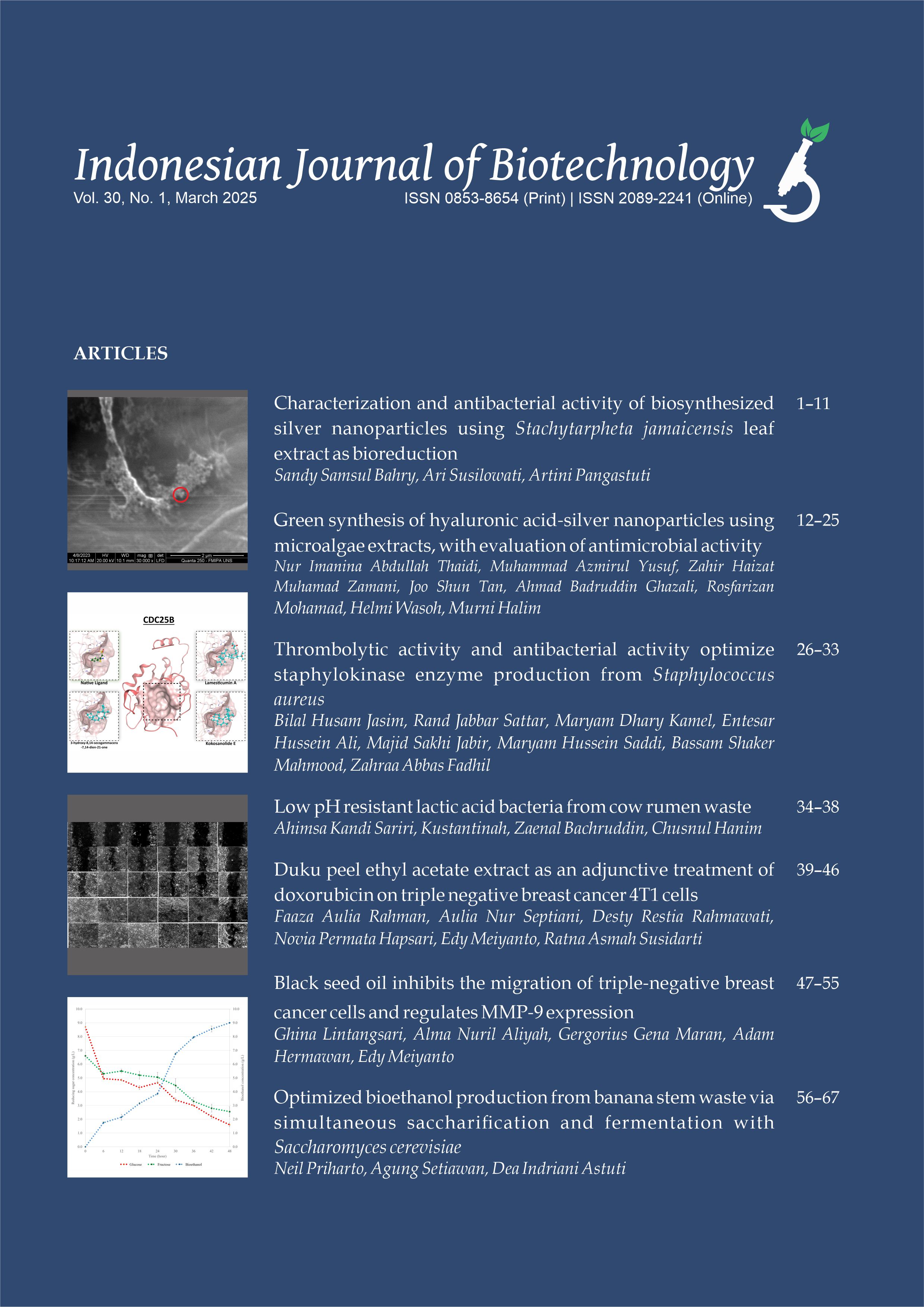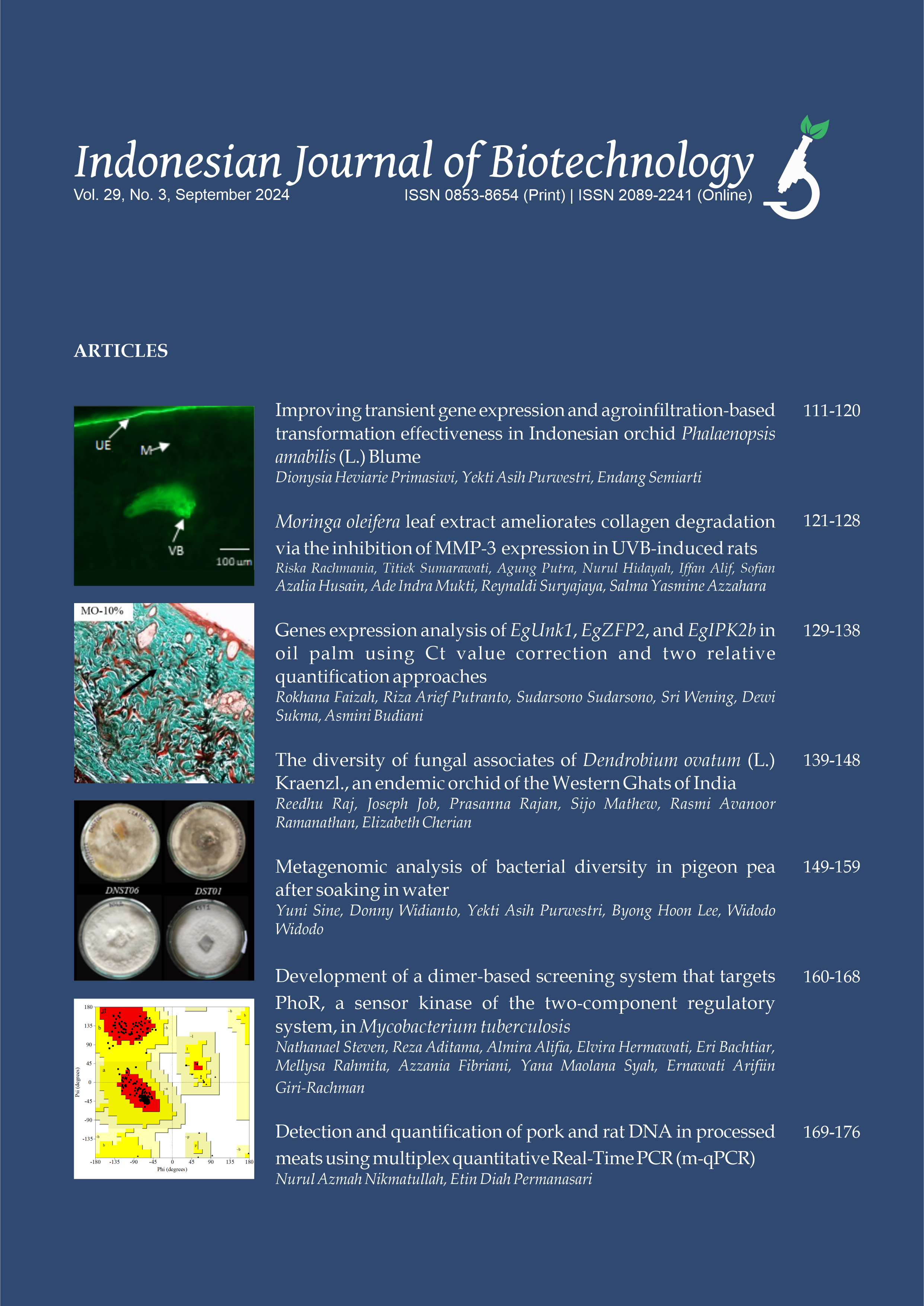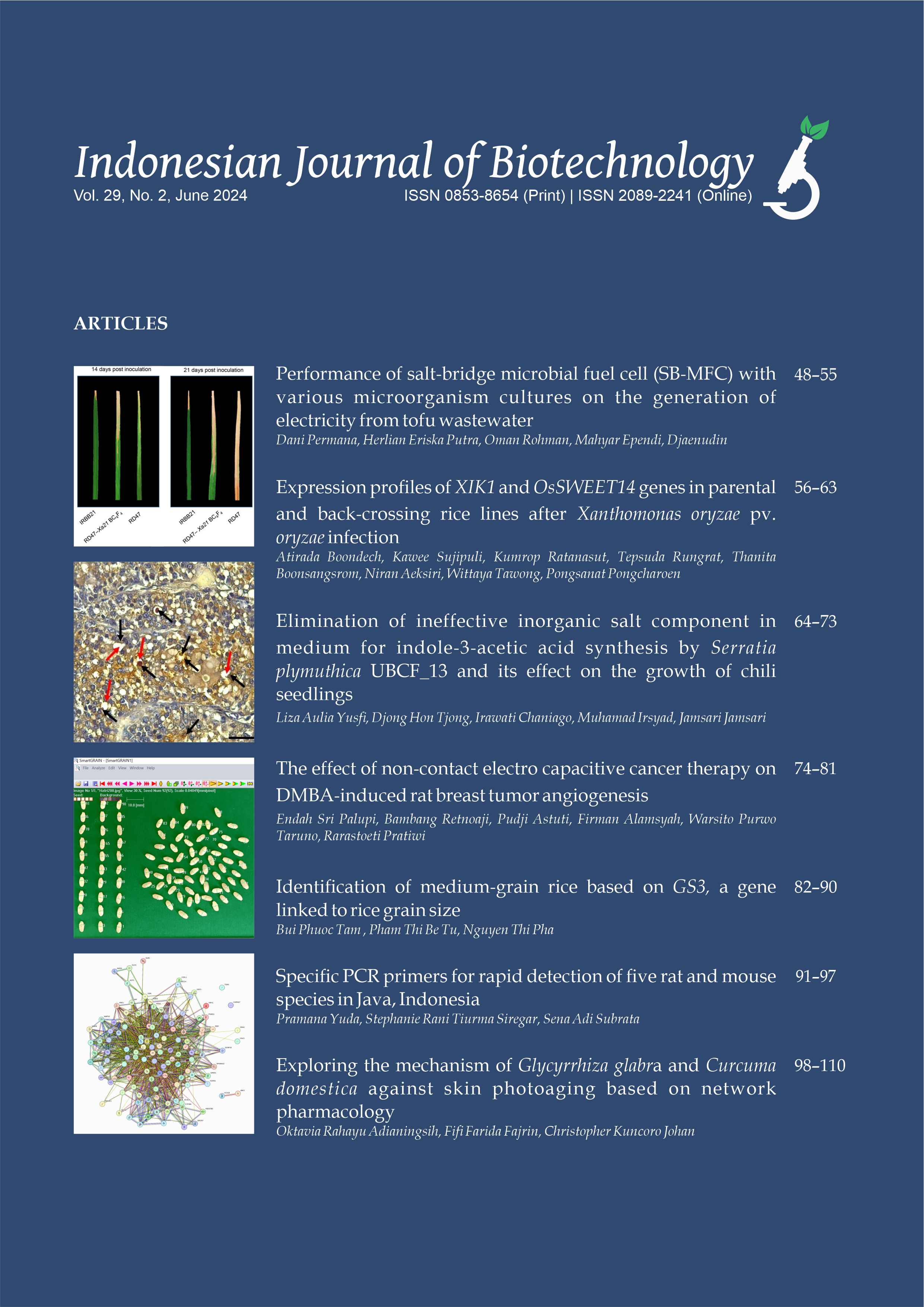Synergistic effects of para-hydroxy meta-methoxy chalcone (pHmMC)- doxorubicin treatments on T47D breast cancer cells
Retno Arianingrum(1*), Retno Sunarminingsih(2), Edy Meiyanto(3), Sofia Mubarika(4)
(1) Doctor Candidate, Biotechnology Study Program, Universitas Gadjah Mada, Yogyakarta, Indonesia Department of Chemistry Education, Faculty of Mathematics and Natural Science, Universitas Negeri Yogyakarta, Yogyakarta, Indonesia
(2) Faculty of Pharmaceutical, Universitas Gadjah Mada, Yogyakarta, Indonesia
(3) Faculty of Pharmaceutical, Universitas Gadjah Mada, Yogyakarta, Indonesia
(4) Faculty of Medicine, Universitas Gadjah Mada, Yogyakarta, Indonesia
(*) Corresponding Author
Abstract
Keywords
Full Text:
PDFReferences
Anonymous. 2012. Cancer facts and figures 2012. American Cancer Society Page 9.
Arianingrum, R., Arty, I.S. and Atun, S. 2010. Uji sitotoksisitas senyawa mono para hidroksi lalkon terhadap Cancer cell lines T47D. Saintek 16(2): 121 -132.
Arianingrum, R., Sunarminingsih, R., Meiyanto, E. and Mubarika, S. 2012. Potential of a chalcone derivate compound as cancer chemoprevention in breast cancer IPCBEE 38: 41-45.
Arianingrum, R., Sunarminingsih, R., Meiyanto, E. and Mubarika, S. 2015. Cytotoxic effect of para hydroxyl chalcone (pHmMC) on MCF-7 breast cancer cells by inducing cell arrest and apoptosis. 2ndICRIEMS proceedings C-11:89-95.
Arty, I.S. 2010. Synthesize and cytotoxic test of several compounds of mono para hydroxy Chalcones. Indo J. Chem. 10 (1): 110-115.
Boumendjel, A., Ronot, X. and Boutonnat. 2009. Chalcone derivatives acting as cell cycle blockers : potential anticancer drugs? J Curr Drug Targets. 10(4): 363-71.
Doyle, A. and Griffth, J.B. 2000. Cell and tissue culture for medical research. New York: John Willey and Sons Ltd.
Drummond, C. 2007. The mechanismof antitumour activity of DNA binding agent SN 280409. Thesis. New Zealand-University of Auckland.
Ducki, S. 2007. The development of chalcones as promising anticancer agents. Drugs 10: 42–46.
Ducki, S. 2009. Antimitotic chalcones and related compounds as inhibitors of tubulin assembly. Anticancer Agents Med. Chem. 9: 336–347.
Ferreira, A.L.A., Matsubara, L.S. and Matsubara, B.B. 2008. Anthracyclineinduced cardiotoxicity. Cardiovasc Hematol Agents Med Chem. 6: 278-281.
Guttridge, D.C., Albanese, C., Reuther, J.Y., Pestell, R.G. and Baldwin Jr., A.S. 1999. NF-κB controls cell growth and differentiation throught transcriptional regulation of cyclin D1. Mol. Cell. Biol. 19: 5785 - 5799.
Hinz, M., Krappmann, D., Eichten, A., Heder, A., Scheidereit, C. and Strauss, M. 1999. NF-κB function in growth control: regulation of cyclin D1 expression and G 0/G1-to-S-phase transition. Mol. Cell. Biol. 19: 2690 - 2698.
Hsu, Y.L., Kuo, P.L., Tzeng, W.W. and Lin, C.C. 2006. Chalcone inhibits the proliferation of human breast cancer cell by blocking cell cycle progression and inducing apoptosis. Food Chem Toxicol 44(5): 704-13
King, R. J. B. 2000. Cancer biology, Pearson Education, Second Edition, England. p.1- 7,228-231, 263-264.
Lammer, C., Wagerer, S., Saffrich, R., Mertens, D., Ansorge, W. and Hoffmann, I. 1998. The cdc25B phosphatase is essential for the G2/M phase transition in human cells, J. Cell. Sci. 111 (Pt 16) 2445-2453.
Lindqvist, A., Kallstrom, H., Lundgren, A., Barsoum, E. and Rosenthal, C.K. 2005. Cdc25B cooperates with Cdc25A to induce mitosis but has a unique role in activating cyclin B1-Cdk1 at the centrosome, J. Cell. Biol. 171(1): 35-45.
Mojzis, J., Varinska, L., Mojzisova, G., Kostova, I. and Mirossay, L. 2008. Antiangiogenic effects of flavonoids and chalcones. Pharmacol. Res. 57: 259–265.
Mosmann, T. 1983. Rapid colorimetric assay for cellular growth and survival: application to proliferation and cytotoxicity assays. J. Immunol Methods 65: 55-63
Nilsson, I. and Hoffmann, I. 2000. Cell cycle regulation by the Cdc25 phosphatase family, Prog. Cell. Cycle Res. 4: 107-114.
Pahl, H.L. 1999. Activators and target genes of Rel/NF-κB transcription factors, Oncogene 18: 6853–6866.
Reddy, M.V.R., Pallela, V.R., Cosenza, S.C., Mallireddigari, M.R., Patti, R., Bonagura, M., Truongcao, M., Akula, B., Jatiani, S.S., and Reddy, E.P. 2010. Design, synthesis and evaluation of (E)-alpha-benzylthio
chalcones as novel inhibitors of BCR-ABL kinase. Bioorg. Med. Chem. 18: 2317–2326.
Reynolds, C.P. and Maurer, B.J. 2005. Evaluating response to antineoplastic drug combinations in tissue culture models. Methods Mol. Med. 110: 173-83.
Robinson, M.W., Overmeyer, J.H., Young, A.M., Erhardt, P.W. and Maltese, W.A. 2012. Synthesis and evaluation of indolebased chalcones as inducers of methuosis, a novel type of nonapoptotic cell death. J.
Med. Chem. 55: 1940–1956.
Sasayama, T., Tanaka, K., Mizukawa, K., Kawamura, A., Kondoh, T., Hosoda, K. and Kohmura, E. 2007. Trans-4-lodo,4’- boranyl-chalcone induces antitumor activity against malignant glioma cell lines in vitro and in vivo. J. Neurooncol. 85: 123–132.
Sharma, G., Tyagi, A.K., Singh, R.P, Chan, D.C and Agarwal, R. 2004. Synergistic anticancer effects of grape seed extract and conventional cytotoxic agent doxorubicin against human breast carcinoma cells.
Breast Cancer Res Treat. 85: 1-12.
Shen, K.H, Chang, J.K., Hsu, Y.L and Kuo, P.L. 2007. Chalcone arrests cell cycle progression and induces apoptosis through induction mitochondrial pathway and inhibition of nuclear factor kappa B signaling in human bladder cancer cells. Basic Clin Pharmacol Toxicol. 101: 254-61.
Simstein, R., Burow, M., Parker, A., Weldon, C. and Beckman, B. 2013. Apoptosis, chemoresistance, and breast cancer: Insights from the MCF-7 cell model system. Exp Biol Med. 101:995-1003.
Tjindarbumi, D. and Mangunkusumo, R. 2002. Cancer in Indonesia, present and future. Jpn. J. Clin. Oncol. 32 (Supplement 1): S17-21.
Tyagi, A.K., Agarwal, C., Chan, D.C.F. and Agarwal, R. 2004. Synergistic anti-cancer effects of silibinin with conventional cytotoxic agents Doxorubicin, Cisplatin and Carboplatin against human breast carcinoma MCF-7 and MDA-MB468 cells.Oncology Reports. 11: 493-499.
Valdameri, G., Gauthier, C., Terreux, R., Kachadourian, R., Day, B.J., Winnischofer, S.M.B., Rocha, M.E.M., Frachet, V., Ronot, X., Di Pietro, A. and Boumendjel, A. 2012. Investigation of chalcones as selective inhibitors of the breast cancer resistance protein: critical role of methoxylation in
both inhibition potency and cytotoxicity. J. Med. Chem. 55: 3193–3200.
Wong, H.L., Bendayan, R., Rauth, A.M., Xue, H.Y., Babakhanian, K. and Wu, X.Y. 2006. A mechanistic study of enhanced Doxorubicin uptake and retention in multidrug resistant breast cancer cells
using a polymer-lipid hybrid nanoparticle system. The Journal of Pharmacology and Experimental Therapeutics 317 (3): 1372- 1381.
Yadav, V.R., Prasad, S., Sung, B. and Anggarwal, B.B. 2011. The role of chalcones in the suppression of NF-kB-mediated inflammation and cancer. International Immunopharmacology 11(3): 295-309.
Yuan, X., Li, T., Xiao, E., Zhao, H., Li, Y., Fu, S., Gand, L., Wang, Zheng, Q. and Wang, Z. 2014. Licochalcone B inhibits growth of bladder cancer cells by arresting cell cycle progression and inducing apoptosis. Food Chem. Toxicol. 65: 242-251.
Zhang, J., Ji, F., Gu, Y., Zhan, X. and Qiao, S. 2014. Chalcones derivatives as potent cell division cycle 25B phosphatase inhibitors. Pharmacol. Reports. 66: 515-519.
Article Metrics
Refbacks
- There are currently no refbacks.
Copyright (c) 2017 Indonesian Journal of Biotechnology

This work is licensed under a Creative Commons Attribution-ShareAlike 4.0 International License.









